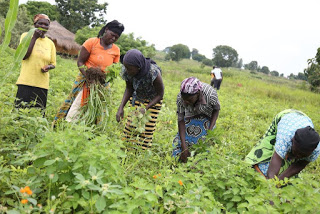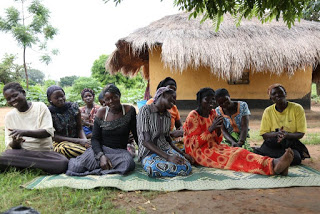UGANDA: Caritas Uganda enhancing household food and nutrition security for South Sudanese Refugees

A section of the Lomiriji group members at their farm harvesting groundnuts
Ever since the civil war in South Sudan began in December 2013, the number of South Sudanese refugees entering Uganda has continued to increase. Many families have suffered under this brutal conflict that has killed hundreds of thousands of people, and caused many more to become internally displaced and refugees in neighbouring countries, especially Uganda and Sudan. About 842,640 South Sudanese refugees have settled in Uganda with a large number living in informal settlements, according to the most recent figures released by the Ugandan government through the Office of the Prime Minister.
The majority of these refugees were settled in Bidibidi Refugee Settlement in Yumbe district located in the West Nile region of Northern Uganda. Each refugee household was allocated a plot of land measuring up to 30×30 meters by the Ugandan government. Although they live in an agricultural community of Yumbe, and with this limited land available, their livelihoods are seriously affected. Unable to buy their own food, these refugees are completely reliant on food aid and other external assistance for survival.
To address the livelihoods challenge, Caritas Uganda implemented an innovative farming project in February 2019, with the aim of improving food and nutrition security and boosting household incomes in Bidibidi. The project was implemented by Caritas Uganda with funding from MaryKnoll Missionary Society (MMS). The two partners have committed to assist about 50 households which include 35 refugees in Bidibidi Zone 2 and 15 host communities of Romogi sub-county, with cassava and groundnuts seedlings to improve food security.
Caritas Uganda tasked each group to work with its members and obtain farming land before receiving this support. Some groups acquired land through collaboration while others through renting.
Joseph Meta, a 27 year-old refugee, is the chairperson of ‘Woko Byi’ Group, a 35 member refugee group in Village 6, Zone 2 in Bidibidi Refugee Settlement.
‘Woko Byi’ is a South Sudanese name which literally means ‘No Running’. We chose this name because as a group we had one goal in mind, which is to work as a team and to discourage members from abandoning the group along the way,” says an excited Meta as the members assemble for the Group’s weekly meeting.
Before displacement to Uganda, Meta had a stable job back in South Sudan where he was working as a farmer in an established private farm. But that is long gone, he now has to start all over again. His group members are now looking up to him for their success, especially following his farming background.
“Caritas Uganda asked us to first secure land before giving us the seedlings thus in March 2019 our group secured one acre of land from the host community at a small fee. We are very happy with their support and sincerely grateful to the donor,” Meta says.
After receiving the cassava and ground nuts seedlings in early February, Meta’s group decided to plant both crops. However, most of seedlings did not germinate, they lost it to drought.
“Due to prolonged drought and lack of rain, we lost most of our crops. The ground was very hard and rocky but we were determined to cultivate our small piece of land and make the most out of it. Unfortunately most of the crops didn’t germinate as we had expected due to the harsh weather,” the 27 year old explains as he takes me around their small rented farm.
In April, during the rainy season in most parts of the country, the ‘Woko Byi’ group came together once again to cultivate their farm. They never lost morale.
“Back home, too, sometimes we had a failed crop. We are hoping to have better harvest this time round since the soil here is very fertile especially with adequate rains. We hope to get enough food for our families’ consumption and sell some as a group when all the crops mature. This will supplement the food aid that we receive from donors. Besides, we plan to keep some cassava cuttings aside to use in the next planting season,” he stresses.
When I asked him about the group’s dream for the future, he says that they hope to get vast land to continue farming and hopefully the donor will give them more support by providing them with a variety of seedlings: tomatoes, spinach, cabbage, onions, maize and even trees.
“In addition, we pray that the donor could support us with hand-held hoes, pangas, gumboots and a simple irrigation system to water our plants during the dry season, enabling farming to go on throughout the year,” the 27 year old explains as he shows me the crops in their group farm.
In Lomiriji village in Romogi sub-county, Caritas Uganda also provided cassava and groundnut seedlings to 15 members from the host community.
“We are very excited and happy with this project because it’s the first of its kind for our community of Romogi. We love farming and we are grateful to the donor for giving us this support,” says an excited Kalisum Chandiru, one of the group members of Lomiriji group.
The group farm was provided by one of the members and they are engaged in farming of more than two types of crops because of the vast size of the farm.
“We were supposed to begin planting immediately after receiving seedlings from Caritas in February, but due to prolonged drought we started operation in early May. In addition to cassava and groundnuts that we received from Caritas, we have planted eggplants,” Mawa Ratibu explains as she leads her members in a group discussion during their weekly meeting.
The 25-year-old is the chairperson of Lomiriji group. “Everyone in this group has a passion for growing food, which becomes our common language on the farm. We all want to improve household food security and nutrition hence we decided to also plant traditional vegetable,” she narrates.
In Romogi sub-county, families are increasingly turning to farming as a source of better nutrition and a way to improve livelihood.
According to Ratibu, after harvesting the members hope to sell about 70% of their farm produce and store some for future use in the next planting season. “This is because we all want to save as much money as possible to pay school fees for our children. Joining a group usually enables women to save some money for supporting their families in case their husbands do not offer them support. This is the biggest advantage of being in a group.”

during their group meeting
She adds, however, that one of the key challenges that the group is facing is lack of proper farm tools to help us reduce the workload during planting. ‘’Previously we have been using hand-held hoes and this has been very tiresome and time consuming. We take long digging the land and yet we have to go back home to take care of the household chores.”
She, therefore, appeals to the donor to provide them with modern farming equipment such as a plough in future if funds allow.
Christine Laura Akello, the Humanitarian Emergency Coordinator of Caritas Uganda says the aim of the project is to see refugees and host communities working together to improve their food and nutrition security, increase their household income and become self-reliant.
“By investing in people’s livelihoods, Caritas Uganda in collaboration with MMS is empowering them to become self-reliant and be a part of the global goal to achieve Zero Hunger. The surrounding host communities have managed to stay in peace with their brothers and sisters from South Sudan. It is thus very important that when any empowerment program comes on board, both parties benefit. So our long term goal is to see this support benefiting hundreds of other communities,’’ explains Akello
BidiBidi Refugee Settlement is an area that covers 250 square kilometers. It currently shelters over 285,000 South Sudanese refugees. The settlement is divided into five zones, and each of these zones is divided into clusters, which are further divided into individual villages surrounded by host community settlements. In early 2017 it was named as one of the largest refugee settlement in the world due to vast size and high number of refugees.
~End~
By Jacinta W. Odongo, Media Officer, Uganda Episcopal Conference


